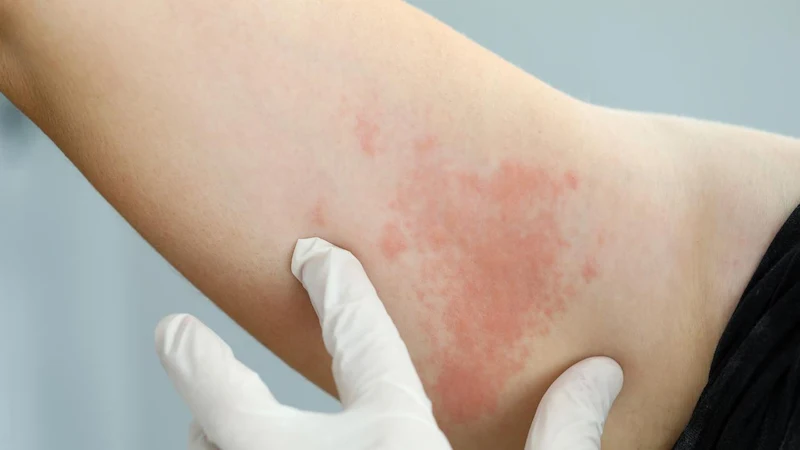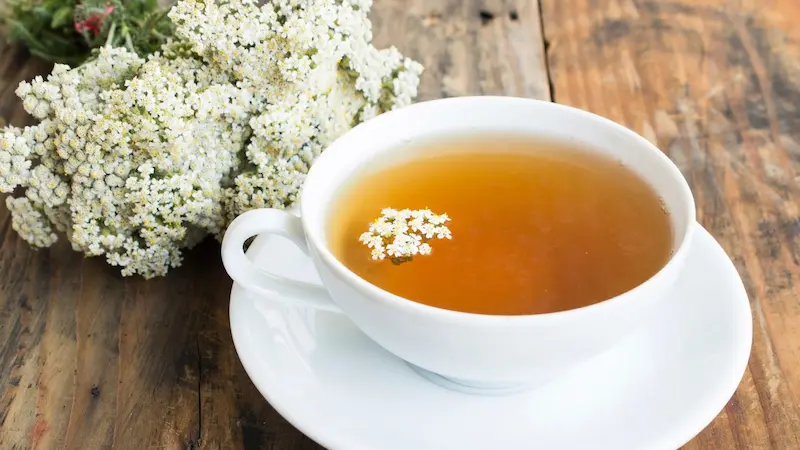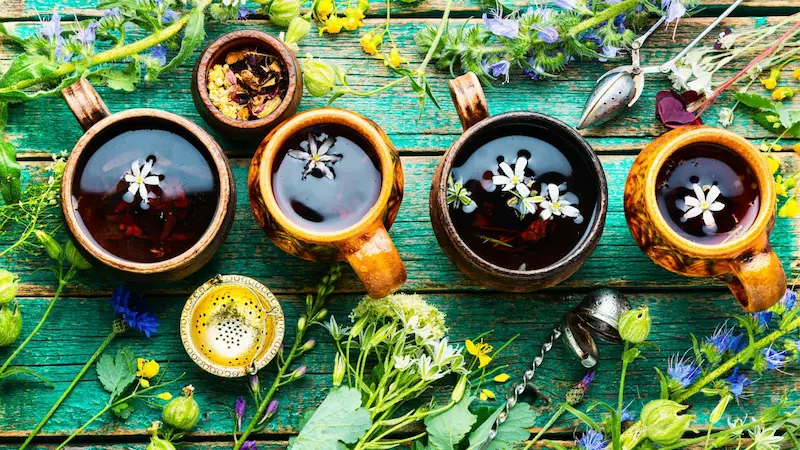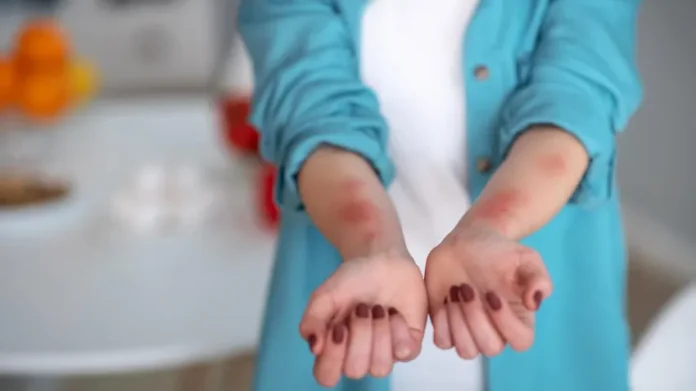Urticaria, often known as hives, is a common skin condition with itchy, raised welts that create a distinctive red rash. These welts can appear anywhere on the body and vary in size, from tiny spots to large blotches. Urticaria is typically a response to certain allergens, leading to a release of histamine that causes localized inflammation and itching. Despite causing discomfort, urticaria is usually a benign condition.
Natural Remedies May Alleviate Urticaria!
However, due to its impact on quality of life, many individuals seek effective management strategies for this condition. While conventional treatments often involve pharmaceutical interventions, an increasing number of people are turning towards natural remedies. These offer gentler ways to alleviate urticaria symptoms, and as we progress in this article, we will explore these natural remedies in detail.
Causes and Triggers of Urticaria
Numerous triggers can set off Urticaria, including allergies, which might occur due to specific foods or environmental factors. Stress, too, plays a role, as do infections, sometimes leading to this skin condition. Moreover, exposure to certain substances or conditions can act as a catalyst. Despite these known triggers, it’s noteworthy that in many instances, the precise cause continues to baffle us.
Symptoms and Complications of Urticaria
Recognizing Urticaria Symptoms
The most common symptom of urticaria is an itchy rash that can appear suddenly. This urticarial rash consists of raised, red or pink welts, often with a pale center. These welts can be small and isolated or can merge to form larger areas of swelling.
Potential Complications
While urticaria is generally a harmless condition, in some cases, it can lead to serious complications, such as angioedema or anaphylaxis, which are severe allergic reactions.

Understanding Natural Remedies for Urticaria
Alternative treatments for urticaria based on natural ingredients represent a milder substitute for conventional treatment methods. These methods rely on natural resources such as plants and essential oils, as well as dietary changes, with the aim of alleviating symptoms. By using these natural remedies, we can provide a treatment that is in harmony with our bodies and nature.
Furthermore, some people choose natural remedies for stinging nettle rash due to the lower likelihood of adverse effects often brought on by conventional medicine. The good news is that there is a wide variety of plants and essential oils with the potential to ease the uncomfortable symptoms of urticaria. In addition, a balanced diet, rich in antioxidants, can aid in improving the immune system, thereby reducing the frequency and intensity of this condition.
Natural Remedies for Urticaria – hives treatment
Applying a cold compress to the affected area can quickly relieve the symptoms of skin irritations like swelling and itching. This simple yet effective remedy numbs the skin and reduces inflammation by constricting the blood vessels. Cold compresses can be an immediate first-aid response despite being a short-term solution. However, further natural or medical treatments should be considered for persistent conditions. Now, let’s explore some of these potential natural remedies.
Herbal Teas
Certain herbs have anti-inflammatory properties that can help reduce urticaria symptoms. Drinking herbal teas is one way to benefit from these properties. Traditionally, herbs like chamomile, ginger, and nettle have been served due to their anti-inflammatory and antihistamine properties. These might be beneficial in managing the symptoms of urticaria.

Tea mixture for the treatment of urticaria
You should prepare teas using a balanced mix of herbs, with 10 grams of each type. These herbal infusions will have three distinct uses: as a drink, for medicinal baths, and for damp compresses…
Tea composition of equal parts herbs
- yarrow flowers (Achillea millefolium)
- burdock leaves (Arctium lappa)
- thyme leaves and flowers (Thymus vulgaris)
- lovage stems (Levisticum officinale)
- nettle fibers (Urtica dioica)
- blackberry leaves (Rubus fruticosus)
- restharrow fibers (Ononis spinosa)
- elecampane leaves (Inula helenium)
Preparation and application of tea
Grind the herbs very finely and mix. In 1 liter of boiled and cooled water, soak 10 g of the herb mixture for 4 hours, then cook on low heat, and when it comes to a boil, keep it on the heat for another minute. Strain the warm tea into a bottle; up to 1 liter can be consumed daily, before and after meals, and instead of water.
For the bath, put 30 g of the mixture into 10 liters of water, and add a handful of bran to this mixture. Cook covered, allowing it to boil for 5 minutes. Moisten the entire body, except for the head, with this tea every other day after bathing.

Treatment of severe cases of urticaria
Tea intended for drinking is recommended three times a day, consuming 1 deciliter before and after meals. In lieu of standard water, a light herbal tea should be sipped. This features a mix of equal parts blackberry leaves, burdock root, nettle leaves, and thyme. To prepare, introduce 5 g of this blend to 2 liters of boiling water, simmering covered for half a minute. Once the tea cools, strain it into a dark bottle and store it, capped, in a cool location.
In all forms of the disease, pay special attention to nutrition. Eat freshly prepared food, well-cooked with plenty of vegetables, especially wild greens. Prepare food using vegetable fat or vegetable oil.
Essential oils for stinging nettle rash
Essential oils like peppermint and lavender are recognized for their calming and anti-inflammatory benefits. You can mix these with a carrier oil for topical application on the affected area or use them in a diffuser for an overall soothing effect. Specific Beneficial Essential Oils – For instance, peppermint oil offers a cooling effect on the skin, relieving itchiness. Meanwhile, lavender oil impresses with its calming and anti-inflammatory attributes.
Dietary Changes
Some individuals might find that certain foods trigger their urticaria. Keeping a food diary can help identify potential triggers and avoiding these foods might help reduce the frequency or severity of outbreaks. Foods rich in natural antihistamines, like vitamin C, quercetin, and omega-3 fatty acids, might also help manage symptoms.
How to Use Natural Remedies for Urticaria Safely
Choosing Quality Natural Remedies
Always opt for high-quality natural remedies, preferably from reputable sources. If using essential oils, make sure they are 100% pure and free from additives.
When to Seek Medical Help
Though you can usually handle mild cases of urticaria at home, you should seek professional medical care if symptoms intensify, last more than 24 hours, or are accompanied by signs of anaphylaxis. These can include difficulty in breathing, facial, lip, or throat swelling, or an urticarial rash that spreads quickly.
Conclusion
Urticaria can be a frustrating condition to live with, but natural remedies offer a variety of options for managing symptoms. Whether through cold compresses, oatmeal baths, herbal teas, essential oils, or dietary changes, these treatments provide a gentle and holistic approach to health. As always, ensure to use natural remedies safely and consult with a healthcare provider as needed.
Frequently asked questions and answers about urticaria
- What is the fastest way to cure urticaria?
A swift alleviation of urticaria symptoms typically involves antihistamine medication and avoiding known triggers. Certain remedies such as cold compresses, herbal teas, and essential oils might provide comfort. Professional medical advice remains critical in this matter. - How long does urticaria last for?
The duration of urticaria, or hives, generally ranges from within 24 hours to several weeks. The type of urticaria significantly influences this time span; while acute urticaria tends to be brief, chronic urticaria may persist for longer periods. - Will I have chronic urticaria forever?
Permanence in the case of chronic urticaria is not guaranteed. Some people might experience this condition for months or even years, yet there are also instances where it resolves over time. A healthcare provider can provide more personalized information regarding this matter. - Is urticaria caused by stress?
Stress has been recognized as a potential trigger for urticaria. Nonetheless, it is not a universal cause, as each case presents its unique set of triggers, which can include allergens, medications, or other factors. - Can urticaria go away on its own?
Urticaria can indeed disappear without intervention, particularly when it’s an instance of acute urticaria. Yet, depending on the trigger, some form of intervention might be necessary. The understanding of the cause significantly contributes to effective management of this condition.
